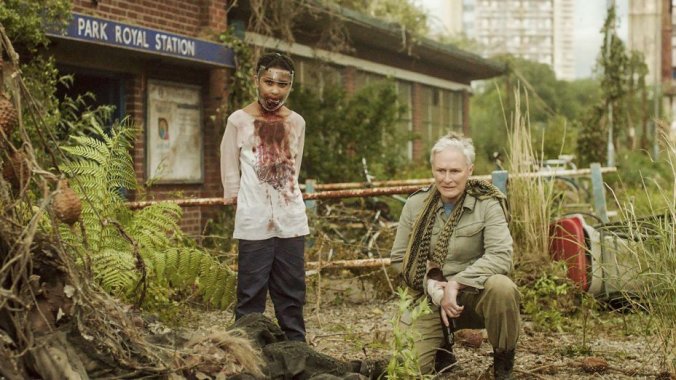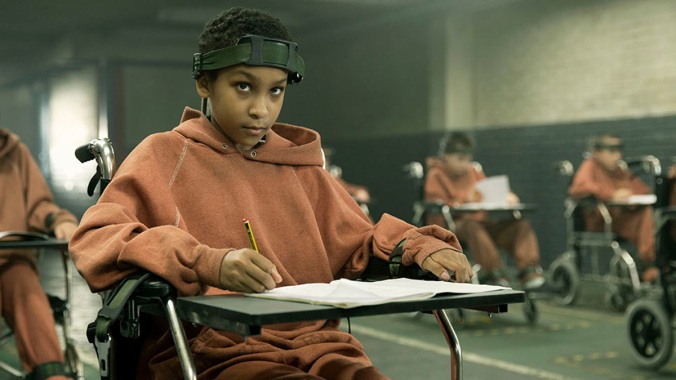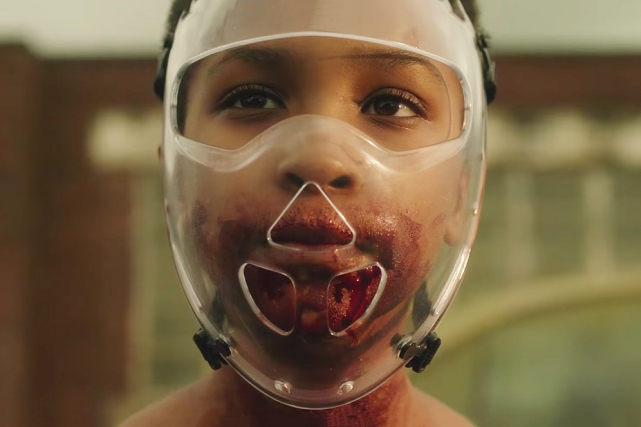
United Kingdom | 23 September 2016 | Directed by Colm McCarthy | Starring: Sennia Nanua, Gemma Arterton, Glenn Close, Paddy Considine, Fisayo Akinade
Don’t be put off by the newest addition to post-apocalyptic canon. Colm McCarthy’s The Girl with All the Gifts is a true British film, meaning it comes with a rejuvenating degree of grit, innovative wit and indie melancholia that can be enjoyed by more than just those who revel in the mindless head-popping of Hollywood zombie flicks. Mike Carey’s screenplay adaptation of his novel of the same name, adds a twist to the usual survival drama, with a conflicted young protagonist undergoing a journey of self-discovery in a society being recycled.
The film begins in a secure bunker come prison, in which the military are holding mysterious child inmates who spend most of their time fastened to wheelchairs. The children are treated like animals by a squadron of pitiless guards until they are wheeled into a classroom to be taught by a contrastingly affectionate teacher, Helen Justineau, played by Gemma Arterton. We quickly realise that one girl, Melanie, played by the astonishing newcomer Sennia Nanua, is noticeably more attentive, intelligent and essentially ‘gifted’ than the other children, despite all possessing a defining hostile trait.

This opening bunker act is particularly brilliant, as until the base is finally breached by the inevitable zombie attack, the audience is never exposed to or even informed about the outside world. Like the children, who clearly know nothing else but this grey, windowless environment (apart from what they learn in Justineau’s story-time), we are literally kept in the dark – until all hell breaks loose.
Melanie’s first view of the outside world is a blood-drenched battle between military and feral infected hoards, which are more related to the terrifying athletic zombies of Danny Boyle’s 28 Days Later as opposed to the stumbling undead of Romero fame. It’s unfortunate that the intriguing bunker section which echoes works like The Handmaid’s Tale and Children of Men does not last longer, as post zombie attack, the film quickly resorts to the pattern of most dystopian road movies.

We are left with a mismatch group including Melanie, Justineau, a handful of soldiers led by pragmatic yet crestfallen sergeant Eddie Parks (Paddy Considine) and the heartless head scientist, Dr. Caroline Caldwell, who wants to sacrifice Melanie to develop a cure against whatever has zombified society. Caldwell, excellently portrayed by the formidable Glenn Close, unabashedly shares her motives to the rest of the group and never sees the child as anything other than a potential cure for humanity.
This lends an interesting facet to the story, in that Caldwell’s desire to kill Melanie positions her as a villain, yet ironically her motives are legitimate and her insensitive, scientific approach is really just an unrelenting determination to save mankind. Whereas Justineau’s affection for Melanie and her recognition of her as a human rather than a specimen, whilst gracious and well-intentioned, is ultimately counter-productive towards serving the greater good. Nonetheless, we undoubtedly sympathise with Melanie and want her to survive no matter what, despite her troubling position within the group.

Caldwell presumes that saving humanity goes without saying and that she almost has a implicit duty to provide a solution if she can. Yet the ultimate issue becomes whether humanity is even worth saving, if there is a more powerful species in question that is more adapted to the new world. Every member of the group is clinging on to a past life that was better than their current state, and they want to return to a state of normality. Yet Melanie never knew the world pre-apocalypse, and everything that the rest of the group perceives as destroyed, bleak or threatening; Melanie sees as new, exciting and fully at her disposal.
Accompanied by a mesmerising score from Cristobal Tapia de Veer, we experience a transforming London through Melanie’s eyes. With the urban ruins overcome with moss and vine, slowly burying the memory of what was once the earth’s centre, we see nature reclaiming its planet and resetting civilisation and the evolutionary process, a concept we are much more accustomed to seeing within the Planet of the Apes series. It is less a story about the end of the world than it is about the beginning of a new one.

What is slightly unsatisfying about The Girl with All the Gifts is that Carey’s story is very similar to that of the beautifully cinematic post-apocalyptic video game The Last of Us, which centres on a single girl, Ellie, who is immune to a worldwide fungal infection that has effectively turned everyone into zombies. Like Melanie, Ellie must ultimately be sacrificed in order for humans to have their only chance at developing a cure, in what is arguably a more dramatic and emotional story with a powerful finale, which The Girl with All the Gifts definitely falls short on. Essentially the game’s enduring popularity within the zombie genre makes The Girl with All the Gifts slightly less original than critics are giving it credit for. Yet moviegoers, who will never come across The Last of Us, will enjoy this refreshingly intelligent and stylish addition to the zombie phenomenon, which should not be avoided because of its overcrowded, clichéd and generally low-brow subject matter.